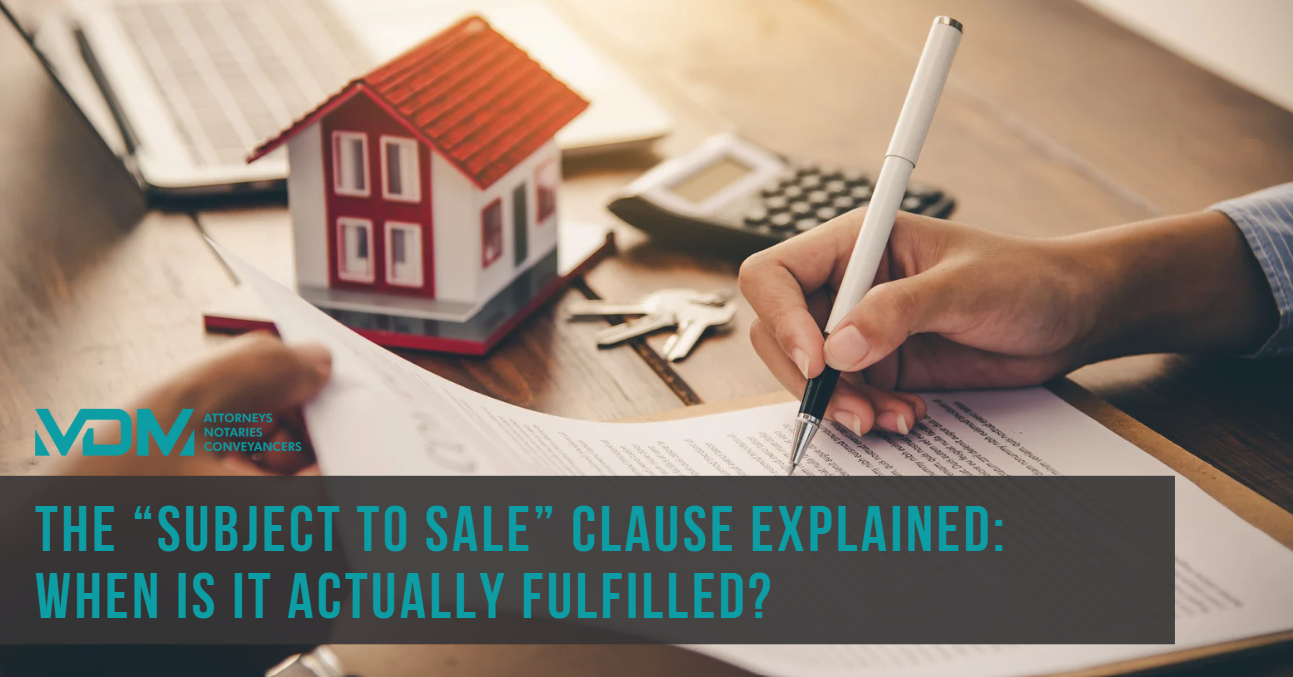
One of the most common suspensive conditions in South African property transactions is the “subject to sale” clause - where a buyer’s offer to purchase (OTP) depends on them first selling their existing property.
It sounds simple, but the timing and legal interpretation of this clause often cause confusion - especially whether it’s fulfilled on sale (when the buyer’s property is sold) or registration (when that sale transfers in the Deeds Office).
Understanding this distinction is crucial for both buyers and sellers, as it determines when a deal becomes binding, when deadlines apply, and when a seller may legally accept another offer.
What Is a “Subject to Sale” Clause?
In essence, a subject to sale clause makes an OTP conditional upon the buyer selling another property. The offer is not binding until that sale occurs.
A typical wording might look like this:
“This offer is subject to the purchaser successfully selling their property at [address] on or before [date].”
But here’s the catch: what does “selling” actually mean in law?
Sale vs Registration - What’s the Difference?
The clause can mean two very different things, depending on how it’s drafted:
1. Subject to Sale
If the clause states the buyer must sell their property, fulfilment occurs when a binding sale agreement is concluded - not when the property registers.
That means:
✅ Once the buyer signs an unconditional OTP for their own property, accepted by the new purchaser, their subject to sale clause is fulfilled.
⚠️ The fact that the transfer hasn’t registered yet does not delay the fulfilment, unless the clause explicitly says “subject to registration.”
This is the more common and practical form, as registration can take 2–3 months, and most sellers won’t wait that long.
2. Subject to Registration
If the clause specifies that the buyer’s property must register in the new purchaser’s name before this OTP becomes binding, fulfilment happens only once transfer is complete in the Deeds Office.
This type is far more restrictive, as it prevents the buyer from moving forward until their existing transfer is finalised. It’s rarely used unless the buyer’s finances depend on receiving proceeds from that sale to fund the new purchase.
What Counts as “Fulfilment” in Practice?
The subject to sale clause is considered fulfilled when:
- The buyer’s existing property is sold in terms of a valid and binding agreement;
- Any suspensive conditions in that agreement (like bond approval) have also been met; and
- The seller of the new property is notified in writing that the clause has been fulfilled - ideally with a copy of the signed sale agreement attached.
If any of these elements are missing, the suspensive condition remains unfulfilled, and the OTP for the new property remains suspended (i.e., not yet binding).
Deadlines and Lapsing of the Offer
The clause must include a specific deadline for the buyer to sell their property - for example:
“The purchaser shall sell their property by no later than 31 January 2026, failing which this agreement shall lapse.”
If the deadline passes without the clause being fulfilled, the entire OTP automatically lapses, unless both parties agree in writing to extend it.
Backup (or “72-Hour”) Clause
Most subject to sale offers are paired with a “72-hour clause” (also called an escape clause or ratification clause). This allows the seller to keep marketing their property and, if they receive another acceptable offer, to give notice (typically 72 hours) to the first buyer to make their offer unconditional.
If the first buyer cannot do so (for example, because their sale hasn’t yet gone through), the seller can lawfully accept the second offer.
This clause protects sellers from being locked into an uncertain deal for months.
Key Takeaways
|
Clause Type
|
Fulfilment Point
|
Practical Meaning
|
|
Subject to Sale
|
When the buyer’s current property is sold (binding OTP signed & suspensive conditions met)
|
The deal proceeds once the buyer’s property is sold, not necessarily transferred.
|
|
Subject to Registration
|
Only once the buyer’s current property registers in the new purchaser’s name
|
The deal is delayed until transfer is finalised in the Deeds Office.
|
|
Subject to Sale & 72-hour clause
|
Buyer must sell or waive the condition within the notice period
|
Seller can accept a better offer if buyer can’t proceed unconditionally.
|
Why the Wording Matters
The subject to sale clause may seem routine, but its exact wording can make or break a deal. If it’s vague, parties can end up arguing over whether the condition was fulfilled, or who is entitled to cancel.
A conveyancer can ensure:
- The clause is clear, dated, and enforceable
- The buyer and seller both understand when obligations kick in
- Extensions or waivers are documented correctly to avoid disputes
Final Thoughts
The subject to sale clause is a powerful tool for buyers who need to sell first - but it must be handled precisely.
Whether fulfilment occurs on sale or registration depends entirely on the wording of the clause, not assumption.
Before signing, always let your conveyancing attorney review the OTP to confirm that the condition protects your interests and timelines are realistic.
📞 Contact VDM Attorneys
Your property. Your security. Our priority.
📧 [email protected] | 🌐 www.vdm.law